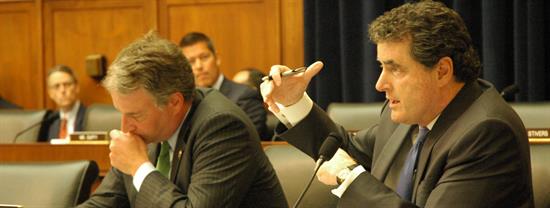Dodd-Frank Erodes Freedom, Opportunity and Rule of Law
Washington,
September 17, 2015
WASHINGTON - As America celebrated Constitution Day on Thursday, the Financial Services Committee held a hearing to examine how hardworking Americans are less free because of the Dodd-Frank Act passed by Congress in 2010. The hearing was the third in a series focused on the harmful impact Dodd-Frank has had on Americans’ prosperity, freedom and financial stability. “Dodd-Frank erodes the economic freedom and opportunity that empowers low income Americans to rise and generate greater shared prosperity. Dodd-Frank moves us away from the equal protection offered by the impartial rule of law towards the unequal and victimizing rule of political bureaucrats. Of all the harm Dodd-Frank inflicts, this is the most profound and disturbing,” said Chairman Jeb Hensarling (R-TX). Instead of protecting Americans’ freedom, Chairman Hensarling continued, “Dodd-Frank exemplifies the insidious belief among many Washington elites that the American people cannot be trusted to make good decisions for themselves so government must do it for them. Without Washington’s coercive mandates, we just might pick the wrong health plan, the wrong mortgage, the wrong financial advisor, maybe even – God forbid – the wrong lightbulb!” Key Takeaways:
Topline Witness Quotes: “Freedom and an effective financial services system go together. Freedom to gain access to capital to start and grow a business, freedom to buy a home and provide for your family’s financial security, freedom to choose those whom you entrust with your hard-earned money provide the means for pursuing the American dream.” - Todd Zywicki, George Mason University Foundation Professor of Law “The very meaning and structure of our Constitution embody the great foundational principle of the rule of law. It is fair to say that the rule of law may be the most significant and influential accomplishment of the long history of human liberty. And yet here we are today, covered by a vast web of rules and regulations, endless policies and programs, all emanating from government, mostly the work of vast agencies and bureaucracies that largely operate outside our rule of law structure.” “It is no exaggeration to say that the greatest political revolution in the United States since the establishment of the Constitution has been the shift of power away from the institutions of republican government to an oligarchy of unelected experts who rule over virtually every aspect of our daily lives, ostensibly in the name of the American people but in actuality by the claimed authority of science, expertise, and administrative efficiency. In assuming more and more tasks in more and more areas for which it is less and less accountable, modern government has done great damage to American liberty and self-government.” - Dr. Matthew Spalding, Associate Vice President and Dean of Education Programs, Hillsdale College “[T]he corporatism enshrined in Dodd-Frank is sharply at odds with the commitment to transparency and competition that has always been the hallmark of American financial regulation. Even apart from the adverse economic effects, it offends our sense of fair play when regulation takes place behind closed doors and with little opportunity for meaningful scrutiny.” - Professor David A. Skeel, University of Pennsylvania Law School ### |


